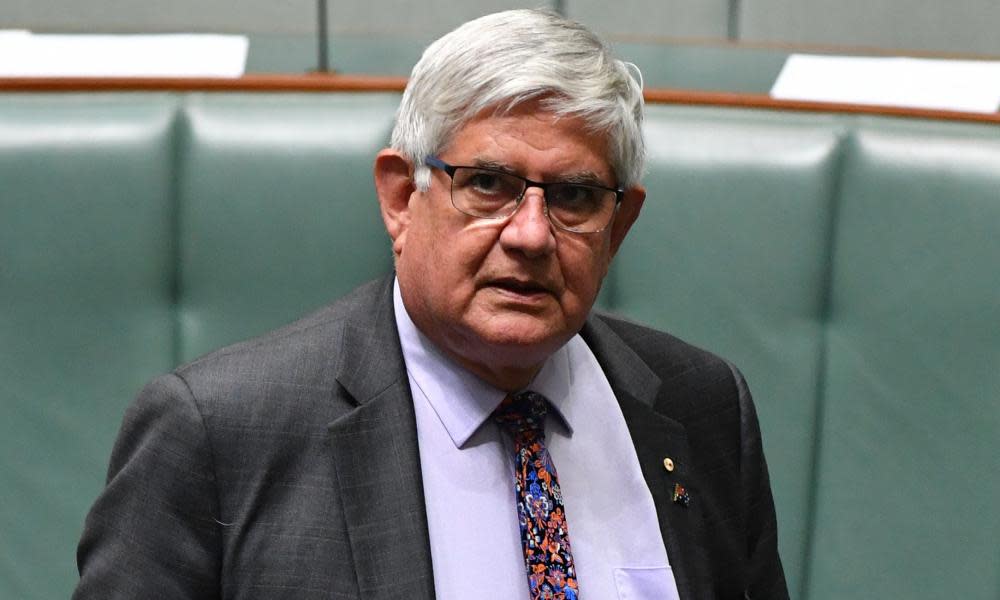Ken Wyatt may ask for resignations from Indigenous body after Bruce Pascoe controversy

The minister for Indigenous Australians said he could ask for resignations by members of his advisory council on a voice to parliament, after one member criticised author and historian Bruce Pascoe and questioned his Aboriginal identity, triggering a rancorous public debate.
Aboriginal businesswoman Josephine Cashman has said Pascoe was not Aboriginal and asked the home affairs minister, Peter Dutton, to investigate Pascoe for allegedly benefitting financially from claiming to be Indigenous.
The minister for Indigenous Australians, Ken Wyatt, told Guardian Australia “the Pascoe debate is led by one of our own, which is a pity because it’s been played out publicly. It’s something that we should deal with within the community.”
Dutton’s office referred the request to the Australian federal police, who on Friday closed the investigation, saying Pascoe’s Aboriginality “was not relevant in determining whether a commonwealth offence had been committed, as such there was no need to undertake these inquiries”.
But Wyatt said the matter would definitely be aired at the next meeting of his advisory council.
“I think what’ll happen is the advisory council will have a discussion,” he said. “I do know that council members have raised the issue with both co-chairs.”
One of the co-chairs, Prof Marcia Langton, has told NITV she thought “running a campaign against an individual like this” was “unconscionable behaviour”.
Professor Marcia Langton rejects claims by Josephine Cashman that question Bruce Pascoe's Aboriginality and the credibility of Dark Emu. pic.twitter.com/Ir2GJKaOrO
— NITV (@NITV) January 17, 2020
Wyatt told Guardian Australia he could make the decision to ask any individual to resign “but I would rather them have the opportunity of sitting with their peers and talking it through and then making their own decision. I think that that is far better than to take a strident line.
“I’d have to consider it, in the reality of if it becomes detrimental to the work of the voice.
“I have to think of the greater good of Aboriginal and Torres Strait Islander people as opposed to a debate between two significant individuals.”
Wyatt said he found it “fascinating” that identity seems to be broadly accepted with every other group, while Indigenous Australians are questioned.
“No one else gets that question,” he said. “A person who says ‘I’m Italian’, even though you know that they were born in this country but their parents are Italian, we accept that.
“But in the Indigenous area, it’s always been questioned, partly because of the way governments in the past categorised us, whether we were ‘full-blood’, ‘half caste’, ‘quarter caste’ or ‘quadroon’, and on that basis then made decisions about what people were eligible for.
“I’ve never questioned another Indigenous person who has said they’re Indigenous. It’s not my place.
Wyatt said it was vital that young Indigenous people saw strong leaders “who are measured in their responses and who provide examples of how you can deal with challenges and work to a solution in a way in which we’re not fighting each other publicly on social media”.
Pascoe is the award-winning author of the 2014 bestseller Dark Emu, a book that challenged assumptions about Indigenous Australia, based on historical records showing Aboriginal people farming and living in large villages.
It was named book of the year at the NSW premier’s literary awards, and has been turned into a children’s book and upcoming ABC TV series. But since its success, Pascoe and his book have been targeted by rightwing commentators such as News Corp’s Andrew Bolt.
Pascoe, who had been in Mallacoota fighting the bushfires over the new year, told the ABC earlier this month that he had been hurt by the accusations.
“Some people think that my association, family association, is too slim to worry about,” he said. “I’ve said that all along that these are distant relationships but they’re important to me, as is every relationship in my family.”

 Yahoo News
Yahoo News 
